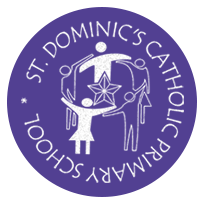At St.Dominic’s we try to embed ICT creatively into as many learning opportunities as possible to prepare children fro the digital world. This afford children opportunities to understand how the digital world interacts with their physical world. It gives children a chance to see how digital media affects them. Children are encouraged to become independent users of software and hardware though exciting and challenging experiences. In the ever-changing digital world, we aim to provide all children with not only the skills to use the technology that exists today, but the life-long the thinking skills and passion to continue to develop their love for computing through secondary school and beyond.we promote digital citizenship through modelling how social media should be used responsibly with a strong focus on creating a good digital footprint. Our school blog shows children what a wonderful audience the internet can be. We aim to develop children’s computational thinking skills, knowledge of computer science concepts and application of digital literacy skills. Our children use information technology to create digital content that enables them to express themselves and develop their ideas as active participants in a digital world.
Digital Leaders
The digital leaders represent children in each class in the school. They promote online safety among their peers and meet regularly to talk about projects they’d like to run in the school. They are the people to see if you need help with your computer.
Curriculum
Early Years Foundation Stage
For our youngest, most adventurous learners we aim to provide a broad, play based curriculum in computing full of a range of exciting activities to encourage interaction with our computing objectives. This includes our outside and garden spaces, too. At St. Dominic’s we recognise that computing is not just about computers. The early years setting is full of imaginative role play and children are encouraged to take part in computing scenarios based on real life events. Children gain confidence, control and language skills through opportunities to ‘paint’ on the whiteboard or use apps for phonics and easy coding. Programmable toys are also used such as beebots, mouse bots and walkie talkies.
Key stage 1
Children in Key Stage 1 will be taught to:
- Understand what algorithms are and how they are implemented as programs on digital devices.
- Understand that programs execute by following a precise and unambiguous sequence of instructions.
- Create and debug simple programs.
- Predict the behaviour of simple programs.
- Create, organise, store, manipulate and retrieve digital content.
- Recognise common uses for computing and other aspects of ICT beyond school.
- Use technology and devices safely and respectfully being mindful of personal information and to identify where to go to for help and support when they have concerns online.
Apps commonly used in KS1
Scratch Junior, Sketches, Green Screen, Stop Motion and Book Creator.
Key Stage 2
- Design and write programs that accomplish specific goals, including controlling or simulating physical systems; solve problems by decomposing them into smaller parts.
- Use sequence, selection, and repetition in programs; work with variables and various forms of input and output; generate appropriate inputs and predicted outputs to test programs. Use logical reasoning to explain how a simple algorithm works and to detect and correct errors in algorithms and programs.
- Understand computer networks including the Internet; how they can provide multiple services, such as the World Wide Web; and the opportunities they offer for communication and collaboration.
- Describe how internet search engines find and store data; use search engines effectively; be discerning in evaluating digital content; respect individuals and intellectual property; use technology responsibly, securely and safely.
- Select, use and combine a variety of software (including internet services) on a range of digital devices to accomplish given goals, including collecting, analysing, evaluating and presenting data and information.
This is a good website for addressing online safety with your children.
This is a good website to learn about parental controls.

